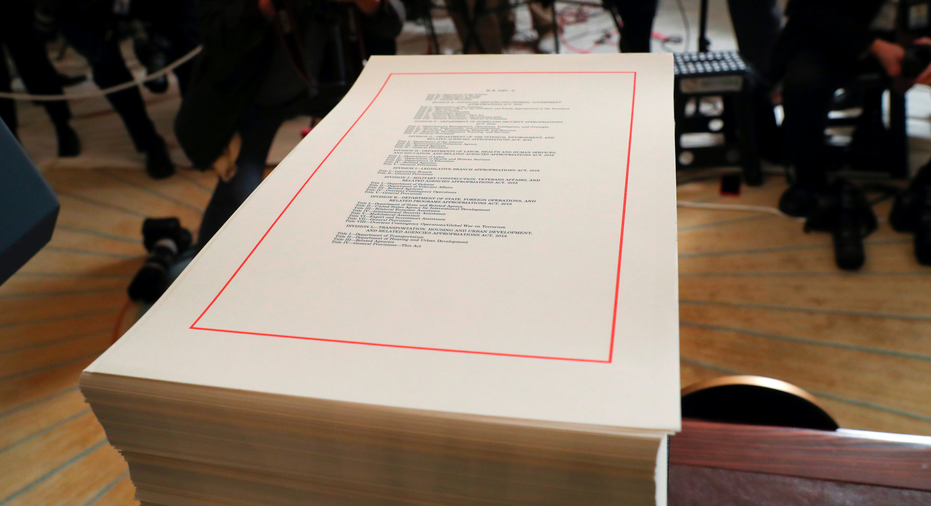Analysis: Tax cuts, spending to raise deficit to $1T by 2020

WASHINGTON – The combined effect of President Donald Trump's tax cuts and last month's budget-busting spending bill is sending the federal deficit toward the $1 trillion mark next year, according to a new analysis by the Congressional Budget Office.
The CBO report says the nation's $21 trillion debt would spike to more than $33 trillion in 10 years, with debt held by investors spiking to levels that would come close to equaling the size of the economy, reaching levels that many economists fear could spark a debt crisis.
Republicans once laced into President Barack Obama for trillion-dollar-plus deficits but mostly fell quiet on Monday's news.
CBO says economic growth from the tax cuts will add 0.7 percent on average to the nation's economic output over the coming decade. Those effects will only partially offset the deficit cost of the tax cuts. The administration had promised the cuts would pay for themselves.
Instead, Monday's report estimates that the GOP tax bill, which is Republican-controlled Washington's signature accomplishment under Trump, will add $1.8 trillion to the deficit over the coming decade, even after its positive effects on the economy are factored in.
The economic growth promises to drop the nationwide unemployment rate below 4 percent starting this year, CBO predicts, though interest rates would rise more rapidly than the agency had earlier predicted, countering some of the positive economic impact of the tax cuts.
The report paints an unrelentingly bleak picture of the federal deficit, predicting it will hit $804 billion this year, rise to just under $1 trillion for the upcoming budget year and permanently breach the $1 trillion mark in 2020 unless Congress stems the burst of red ink.
The government would borrow about 19 cents of every dollar it spends this year. Deficits would grow to $1.5 trillion by 2028 — and could exceed $2 trillion if the tax cuts are fully extended and if Washington doesn't cut spending.
"Such high and rising debt would have serious negative consequences for the budget and the nation," said CBO Director Keith Hall. "In particular, the likelihood of a fiscal crisis in the United States would increase."
Republicans controlling Washington have largely lost interest in taking on the deficit, an issue that has fallen in prominence in recent years. Trump has ruled out cuts to Social Security and Medicare, and Capitol Hill Republicans have failed to take steps against the deficit since Trump took office.
But if warnings of a future fiscal crisis turn out to be true, lawmakers might be forced to take painful steps, Hall warned, that would be more draconian than if they tackled the deficit now.
With conservatives complaining about the $1.3 trillion catchall spending bill — which blew through previous budget limits by $300 billion over this year and next — House GOP leaders have scheduled a vote this week on a proposed amendment to the Constitution to require a balanced federal budget. The vote is sure to fall well short of the two-thirds required to pass and is being rushed to a vote without hearings or committee debate.
"The CBO's latest report exposes the scam behind the rosy rhetoric from Republicans that their tax bill would pay for itself," said top Senate Democrat Chuck Schumer of New York. "The American people deserve a Congress that is focused squarely on helping the middle class, not patronizing Kabuki theatre — like sham 'balanced budget' votes — from Republicans who blew up the deficit to benefit wealthy special interests."
The White House is also likely to propose rolling back some of the spending increases in the government-wide funding bill, targeting domestic programs backed by Democrats, but the idea isn't gaining much traction on Capitol Hill.
"It's going nowhere," said Sen. Lindsey Graham, R-S.C. "We made a deal."
Republicans are unlikely to pass even a nonbinding budget blueprint, instead opting to take a pause in the heat of election season.
"Without question, we have challenging work ahead," said House Budget Committee Chairman Steve Womack, R-Ark., who promised he will be "working with my colleagues in the days ahead to craft a responsible budget plan."
Many economists believe that if deficits continue to rise and the national debt grows, government borrowing will "crowd out" private lending and force up interest rates. And if interest rates go up, the government will have to pay much more to finance the more than $14 trillion in Treasury debt held by investors.
Last year's deficit registered $665 billion, which was well below the record $1.4 trillion posted during Obama's first year in office, when the Great Recession led to plunging revenues and a spike in spending. The deficit settled below $500 million for part of Obama's second term but has steadily risen since then.
The new report predicts the economy will grow by 3.3 percent this year but that gross domestic product growth will drop to 1.8 percent by 2020. It warns that interest rates on government borrowing will spike, with the benchmark 10-year Treasury note, currently yielding 2.8 percent, will average a 3.0 percent interest rate this year and 3.7 percent next year.
"We expect interest rates to accelerate faster," said CBO's Hall.



















